2014-2015学年高中英语配套课件:Unit 3 Travel journal《Section Three Grammar》(人教版必修1)(16张PPT)
文档属性
| 名称 | 2014-2015学年高中英语配套课件:Unit 3 Travel journal《Section Three Grammar》(人教版必修1)(16张PPT) |  | |
| 格式 | zip | ||
| 文件大小 | 675.8KB | ||
| 资源类型 | 教案 | ||
| 版本资源 | 人教版(新课程标准) | ||
| 科目 | 英语 | ||
| 更新时间 | 2015-03-28 12:49:29 | ||
图片预览

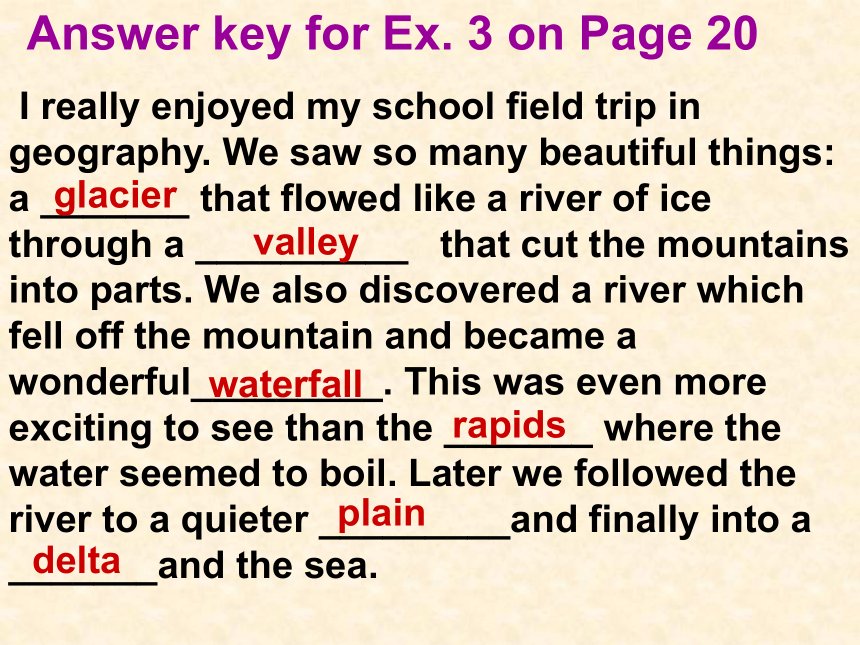
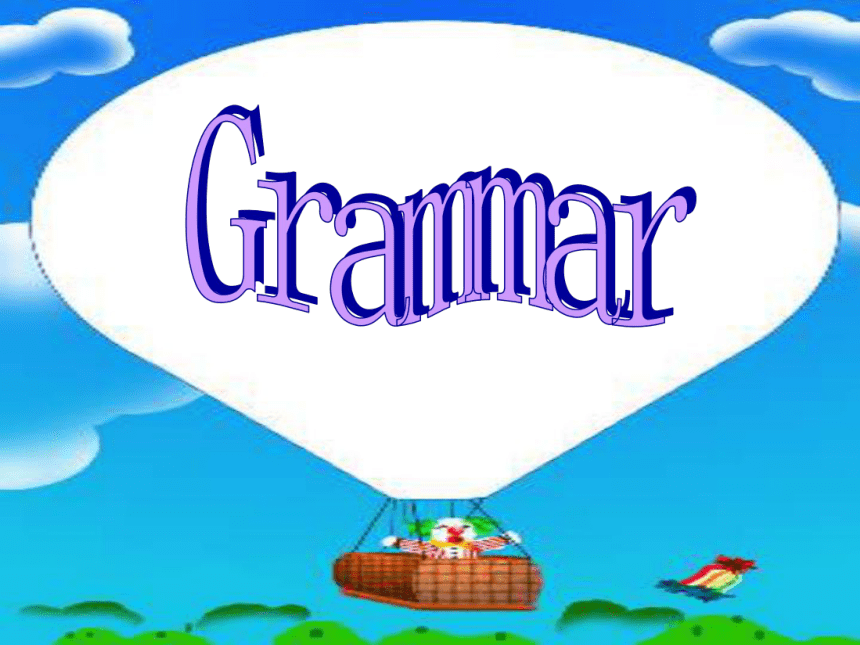
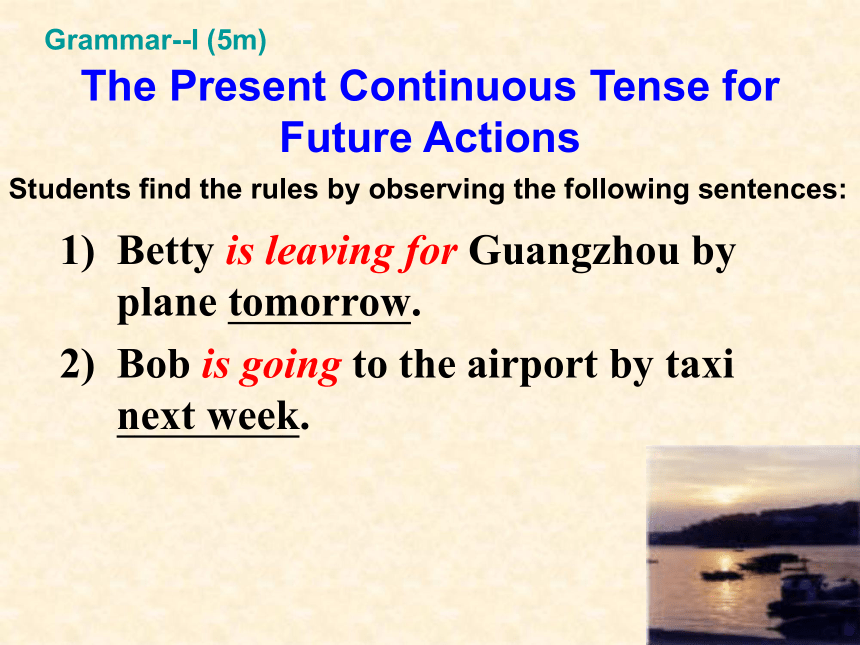
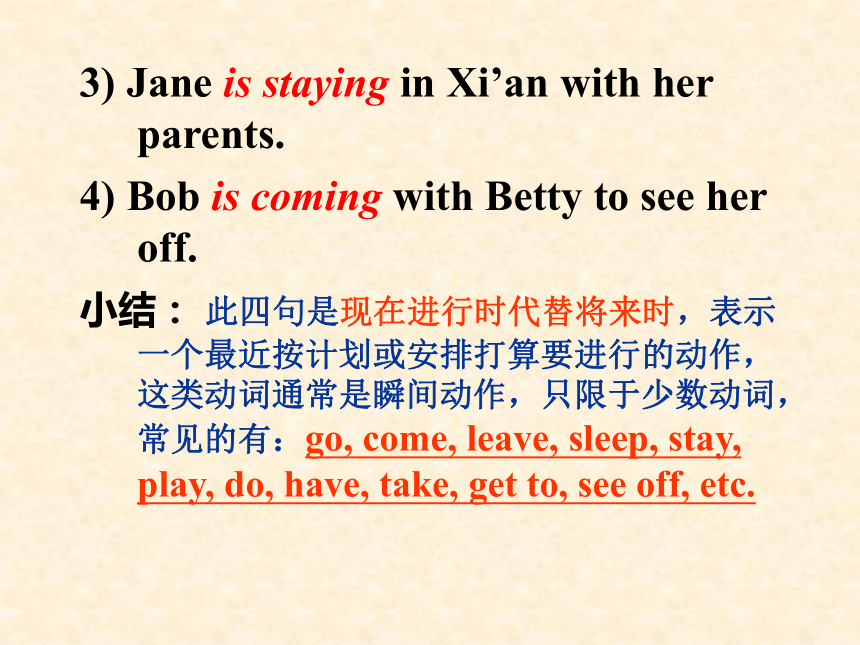
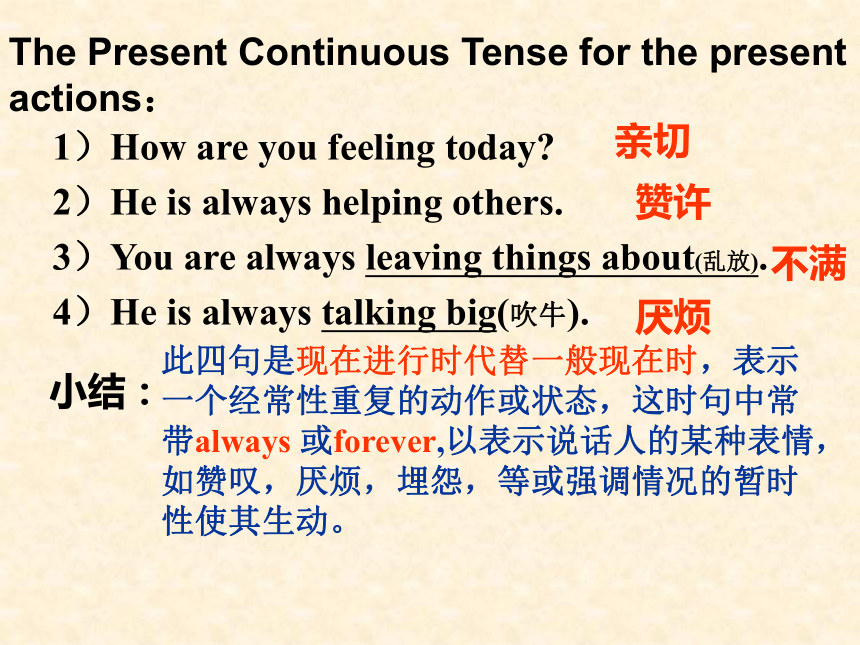
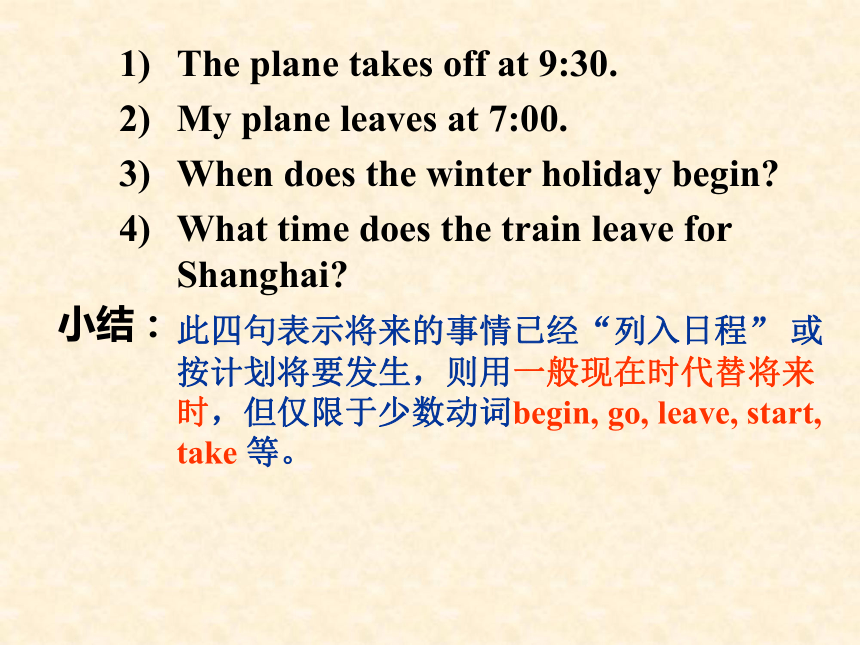
文档简介
课件16张PPT。Unit3 Travel journal I really enjoyed my school field trip in geography. We saw so many beautiful things: a _______ that flowed like a river of ice through a __________ that cut the mountains into parts. We also discovered a river which fell off the mountain and became a wonderful_________. This was even more exciting to see than the _______ where the water seemed to boil. Later we followed the river to a quieter _________and finally into a _______and the sea. Answer key for Ex. 3 on Page 20glacierdeltaplainrapidswaterfallvalleyGrammar
The Present Continuous Tense for Future ActionsBetty is leaving for Guangzhou by plane tomorrow.
Bob is going to the airport by taxi next week.Grammar--I (5m)Students find the rules by observing the following sentences:3) Jane is staying in Xi’an with her parents.
4) Bob is coming with Betty to see her off.
小结: 此四句是现在进行时代替将来时,表示一个最近按计划或安排打算要进行的动作,这类动词通常是瞬间动作,只限于少数动词,常见的有:go, come, leave, sleep, stay, play, do, have, take, get to, see off, etc.
1)How are you feeling today?
2)He is always helping others.
3)You are always leaving things about(乱放).
4)He is always talking big(吹牛).亲切赞许不满厌烦此四句是现在进行时代替一般现在时,表示一个经常性重复的动作或状态,这时句中常带always 或forever,以表示说话人的某种表情,如赞叹,厌烦,埋怨,等或强调情况的暂时性使其生动。The Present Continuous Tense for the present actions:小结:The plane takes off at 9:30.
My plane leaves at 7:00.
When does the winter holiday begin?
What time does the train leave for Shanghai?
此四句表示将来的事情已经“列入日程” 或按计划将要发生,则用一般现在时代替将来时,但仅限于少数动词begin, go, leave, start, take 等。小结:
(1)表示现在的动作:
表示说话的时刻正在进行的动作,常与时间状语now, at the moment等连用。
表示现在阶段正在进行的动作,而不一定是说话时正在进行的动作,常与today, this week, this term等连用。
现在进行时用法归纳 Grammar--II (10m)I’m sitting on a rock near the river with my friends.
我和我的朋友们正坐在河边的一块岩石上。
Right now it is the summer vacation and I’m helping my dad on the farm.
现在是暑假,我在农场帮我爸爸干活。
(2)表示反复性或习惯性的动作,常与副词always, continually(频繁地)等连用,表示说话人的赞扬,厌恶,不满,遗憾等的感彩。
She’s always changing her mind.
她老是改变主意。(厌烦)
(3)表示不久之后肯定将发生,或按计划或安排将要做的事(常与未来的时间状语连用),能这样用的动词多是表示“位移”“停留”的,如come, go , leave, arrive, start, begin等。
Mother is taking us home to see my grandma on Sunday.
星期天母亲将带我们回老家看我祖母。
He will write you a letter next week.
他下个星期会给你写信。
小结:will/shall+动词原形,表示将来某个时间要发生的动作或存在的状态;或表示自然趋势或非主语意志。
I shall be sixteen years old next month.
下个月我将十六岁了。(自然趋势)
表示将来的时态还有下列的方法:②be going to +动词原形,表示“就要……”,“打算……”或将要发生的事。
We’re not going to have any classes next week.
表示“位移”的词,如arrive, come, go , leave, start, begin等,可用一般现在时表示将来安排好或即将发生的事。语气比现在进行时更肯定。
The next train leaves at 9:15.
Because the shop___________, all the T-shirts are sold at half price.
A. has closed down B. closed down
C. is closing down D. had had closed down (close down关闭,歇业)
2. I’ve won a holiday for two weeks to Florida. I______ my mum.
am taking B. have taken
C. take D. will have taken 附:高考题CA3. ----Can I join your club, Dad?
-----You can when you _______ a bit older. (NMET 1994)
get B. will get
C. are getting D. will have got
4. At this time tomorrow ______over the Atlantic. (2003年北京高考)
we’re going to fly B. we’ll be flying
C. we’ll fly D. we’re to flyAB在时间、条件、让步、方式状语从句中,用一般现在时代替将来时。
Bob is going to the airport by taxi next week.Grammar--I (5m)Students find the rules by observing the following sentences:3) Jane is staying in Xi’an with her parents.
4) Bob is coming with Betty to see her off.
小结: 此四句是现在进行时代替将来时,表示一个最近按计划或安排打算要进行的动作,这类动词通常是瞬间动作,只限于少数动词,常见的有:go, come, leave, sleep, stay, play, do, have, take, get to, see off, etc.
1)How are you feeling today?
2)He is always helping others.
3)You are always leaving things about(乱放).
4)He is always talking big(吹牛).亲切赞许不满厌烦此四句是现在进行时代替一般现在时,表示一个经常性重复的动作或状态,这时句中常带always 或forever,以表示说话人的某种表情,如赞叹,厌烦,埋怨,等或强调情况的暂时性使其生动。The Present Continuous Tense for the present actions:小结:The plane takes off at 9:30.
My plane leaves at 7:00.
When does the winter holiday begin?
What time does the train leave for Shanghai?
此四句表示将来的事情已经“列入日程” 或按计划将要发生,则用一般现在时代替将来时,但仅限于少数动词begin, go, leave, start, take 等。小结:
(1)表示现在的动作:
表示说话的时刻正在进行的动作,常与时间状语now, at the moment等连用。
表示现在阶段正在进行的动作,而不一定是说话时正在进行的动作,常与today, this week, this term等连用。
现在进行时用法归纳 Grammar--II (10m)I’m sitting on a rock near the river with my friends.
我和我的朋友们正坐在河边的一块岩石上。
Right now it is the summer vacation and I’m helping my dad on the farm.
现在是暑假,我在农场帮我爸爸干活。
(2)表示反复性或习惯性的动作,常与副词always, continually(频繁地)等连用,表示说话人的赞扬,厌恶,不满,遗憾等的感彩。
She’s always changing her mind.
她老是改变主意。(厌烦)
(3)表示不久之后肯定将发生,或按计划或安排将要做的事(常与未来的时间状语连用),能这样用的动词多是表示“位移”“停留”的,如come, go , leave, arrive, start, begin等。
Mother is taking us home to see my grandma on Sunday.
星期天母亲将带我们回老家看我祖母。
He will write you a letter next week.
他下个星期会给你写信。
小结:will/shall+动词原形,表示将来某个时间要发生的动作或存在的状态;或表示自然趋势或非主语意志。
I shall be sixteen years old next month.
下个月我将十六岁了。(自然趋势)
表示将来的时态还有下列的方法:②be going to +动词原形,表示“就要……”,“打算……”或将要发生的事。
We’re not going to have any classes next week.
表示“位移”的词,如arrive, come, go , leave, start, begin等,可用一般现在时表示将来安排好或即将发生的事。语气比现在进行时更肯定。
The next train leaves at 9:15.
Because the shop___________, all the T-shirts are sold at half price.
A. has closed down B. closed down
C. is closing down D. had had closed down (close down关闭,歇业)
2. I’ve won a holiday for two weeks to Florida. I______ my mum.
am taking B. have taken
C. take D. will have taken 附:高考题CA3. ----Can I join your club, Dad?
-----You can when you _______ a bit older. (NMET 1994)
get B. will get
C. are getting D. will have got
4. At this time tomorrow ______over the Atlantic. (2003年北京高考)
we’re going to fly B. we’ll be flying
C. we’ll fly D. we’re to flyAB在时间、条件、让步、方式状语从句中,用一般现在时代替将来时。
